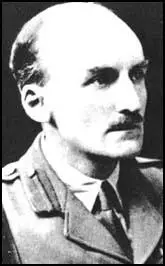Sir John Fuller

John Fuller, was born in Chichester in 1878. After Sandhurst College, Fuller was commissioned in the Oxfordshire & Buckinghamshire Light Infantry in 1898 and the following year took part in the Boer War. This was followed by service in India (1903-06). While adjutant with the Middlesex Regiment he began writing about military tactics and weapon training.
In the first two years of the First World War Fuller was mainly involved in training officers. This included the creation of an Officers' School for the Third Army and the BEF Senior Officers Course. In December, 1916, he became the first Chief General Staff Officer of the Royal Tank Corps.
Initially, Fuller was not a great supporter of tanks, however, he soon grasped their significance for modern warfare. Aware of the tank's early problems, Fuller argued that they should only be deployed when the terrain was appropriate. At Amiens he managed to persuade General Henry Rawlinson to use 412 tanks followed by soldiers and supported by over 1,000 aircraft. The strategy worked and the Allies managed to breakthrough the German frontline.
Fuller was disappointed with the way tanks were used during the war and afterwards he produced Plan 1919. The plan called for long-range mass tank attacks with strong air, motorized and artillery support. The plan was ignored by the British Army but was studied in Germany and became the blueprint for what became known as blitzkrieg tactics.
Fuller retired in 1933 and became known for his military writings, including Reformation of War (1923), Foundation of the Science of War (1926) and Memoirs of an Unconventional Soldier (1936).
Fuller developed extreme right-wing opinions and joined anti-Semitic organizations such as The Link and the Nordic League. In April 1939 travelled to Nazi Germany with Duke of Beccleuch and Lord Brocket to celebrate the fiftieth birthday of Adolf Hitler.
Sir John Fuller died in 1966.
